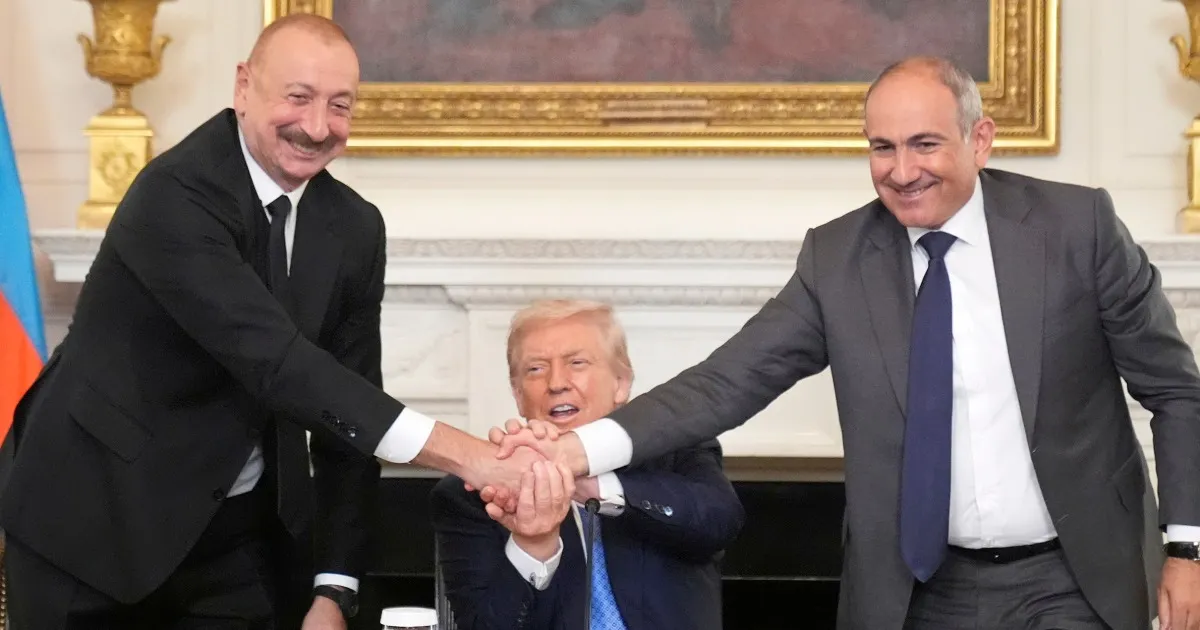
In a significant diplomatic breakthrough, the leaders of Armenia and Azerbaijan met at the White House on Friday, engaging in a handshake that symbolizes the end of decades-long hostilities. U.S. President Donald Trump facilitated this landmark moment as he stood between Azerbaijani President Ilham Aliyev and Armenian Prime Minister Nikol Pashinyan. The handshake, representing newfound cooperation, was a crucial step towards peace in the turbulent region of the South Caucasus.
During this pivotal summit, the two nations signed agreements not only with each other but also with the United States, aimed at reopening essential transportation routes. These agreements will strategically position the U.S. to capitalize on Russia's declining influence in the region. Among the most notable elements of the deal is the establishment of a major transit corridor, which will be named the Trump Route for International Peace and Prosperity. President Trump expressed that while he perceived it as a great honor to have the route named after him, he did not request it, revealing that the suggestion came from the Armenian side.
President Trump has actively sought to portray himself as a global peacemaker, openly aspiring for a Nobel Peace Prize. The agreements signed on Friday contribute to a series of peace and economic initiatives brokered by the U.S. in recent months. Both leaders credited Trump and his administration for facilitating this breakthrough. Prime Minister Pashinyan described the agreement as a “significant milestone” and emphasized the commitment to crafting a better future. President Aliyev praised Trump’s efforts, stating that “in six months, he did a miracle.”
The newly established route will connect Azerbaijan with its autonomous Nakhchivan exclave, traversing a stretch of Armenian territory approximately 32 kilometers (20 miles) wide. This connection, long sought after by Azerbaijan, had previously stalled peace negotiations. For Azerbaijan, a key player in the oil and gas markets, the route also offers a more direct pathway to Turkey and Europe, enhancing its economic prospects.
This peace agreement serves as a significant geopolitical maneuver against Russia, which has historically acted as a mediator in the region. Following Russia's full-scale invasion of Ukraine in February 2022, its influence in the South Caucasus has diminished. The U.S.-brokered deal allows for an expansion of American influence as Moscow's presence recedes. The Trump administration's engagement with Armenia and Azerbaijan began earnestly earlier this year, focusing on what a senior official described as a “regional reset.”
Negotiations regarding the development of the Trump Route—which will encompass a rail line, oil and gas pipelines, and fiber optic lines—are expected to commence next week. There are already at least nine developers interested in this project. In addition to the joint agreements, both Armenia and Azerbaijan entered into separate agreements with the U.S. that aim to strengthen cooperation in areas such as energy, technology, and the economy. Trump hinted at the potential of these agreements in a social media post, stating they would “fully unlock the potential” of the South Caucasus region.
The Armenia-Azerbaijan conflict has persisted for nearly four decades, primarily centered around the contested Karabakh region—also known as Nagorno-Karabakh. This area, predominantly populated by Armenians during the Soviet era, lies within Azerbaijan's borders. The two nations have engaged in several violent clashes over control, resulting in tens of thousands of casualties. Azerbaijan recently reclaimed all of Karabakh in 2023 and has since been in discussions with Armenia to normalize relations. The demand for a land bridge to Nakhchivan had previously stalled negotiations, but the prospect of closer ties with the U.S. has incentivized Armenia's participation in the broader agreement.
As Armenia seeks to distance itself from Russian influence and pivot toward the West, the peace agreement offers a pathway to stability and collaboration in the region. Azerbaijan, buoyed by its recent victory in Karabakh, has adopted a more assertive posture in its dealings with Moscow, marking a transformative moment in South Caucasus geopolitics.